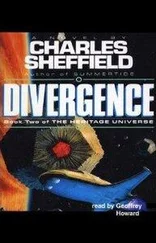“I wish I could. But I have a lot of work to do.” Auden stared at Lopez’s big, brown hand, with a thick gold band on its index finger. It was a contrast to his own forearm, white and freckled and golden-haired and just a couple of inches away. He withdrew his arm a little, trying to make the movement look natural. “It’s really nice of you to ask me.”
“I think you would enjoy yourself.” Nick Lopez pulled his hand away and smiled warmly at Auden. “Look, this is going to sound peculiar. But are you scared of me?”
“Scared? Well, no, not scared, I wouldn’t say that.” Auden did his best to smile back. “But you have a — well, let’s say, a reputation.”
“Auden, for Christ’s sake.” Nick Lopez laughed aloud. “I’m a politician, and this is Washington. The original city for, ’Unless you’ve got something horrible to say about him, I don’t want to hear it.’ Remember Harry Truman’s advice? ’If you want a friend in Washington, get a dog.’ Sure, people say things about me. They say things about your boss, too. One day they’ll say things about you.”
“But there was — well, that court case . . .” Auden couldn’t bring himself to be more specific.
“Raymond Silvers, and his attempt to kill me? That’s a perfect example of what I mean. If you want to know what really happened, you should read the actual court hearings. You’ll see that I didn’t do a thing except reject his unwanted advances. But the media all hate me, I’m much too patriotic for them. They distort everything. I can’t let their rumors and lies control my life. Or yours.” He moved his hand again, this time placing it lightly onto Auden’s forearm. Auden felt the goose bumps rise, as unwanted and as uncontrollable as a blush.
“Look,” Lopez went on, “I’ll make you a promise. You arrive at the party with me, but after that you’re on your own. You talk with anyone you want to. You do whatever you want to. You leave anytime you want to. What do you say?”
“It sounds very interesting. I’ve hardly left my desk for two weeks. And I haven’t been out to a party in months. My clothes—”
“ — are fine, just the way they are. I told you, this is informal. One question, though. Do you have anybody at the moment?”
“You mean, anybody, like—”
“Yes, that is exactly what I mean. Look, Auden, I’m not being nosy, but I know one thing for sure. When I show up at the party with somebody looking like you, and people realize that the two of us aren’t an item, that’s the first question I’m going to be asked. So I’m asking you ahead of time. Do you have someone?”
“Not right now, Senator. Last year.”
“Not ’Senator,’ please. Call me Nick, or Nicky — you’ll have to call me that at the party; everyone else does. And last year was last year, it doesn’t count. We all have pasts. Now the New Year, reviving old desires . . . Ah, my beloved, fill the cup that clears, today of past regrets and future fears . . .” He took Auden’s hand and squeezed it. “Now, I’m really in your power. You have a secret of mine that all Washington would love to know, something you must never reveal. Nick Lopez, quoting old poetry — and not even good old American poetry. It would ruin my reputation. Let’s go.”
And, as Auden rolled down his shirtsleeves and picked up his jacket, Lopez added softly and in a different voice, “There’s one other thing I have to say, Au-den. You can make what you like of this, forget it or ignore it or use it any way you choose. But so far as I am concerned, I’m really thrilled that you don’t have anybody now.”
When would the orbiters leave the space station to make their reentry?
Where would they land?
Who would be on each one?
Zoe Nash had taken total responsibility for those three decisions. “I’ll tell you, when, and where, and who.”
Zoe was confident, if not casual, and for that Celine was profoundly grateful. Thinking about the situation as she made her way through the silent interior of ISS-2, she knew she would have agonized endlessly and never been able to come up with answers. She was a natural procrastinator, able to see a hundred roads to failure.
How much preparation was enough? To Celine, two days was a ridiculously short time. On the other hand, you could check instruments and programs forever and still miss something. How did you divide the group in two? It was absolutely necessary, but how did you decide the mix of skills to place on each orbiter? The whole point of the Mars expedition crew was that it worked best as a single integrated unit.
Fortunately, Celine had a practical task to occupy her mind. She had been told to search the derelict for a dozen of a particular type of bonding clamp, needed in the orbiters, and she had located a whole cabinet of them in the central supply room of ISS-2. Now she was heading back through the desolate corridors. The previous two days had not hardened her to the sight of the frozen corpses, but she knew where they were and she had learned not to look at them.
At the open airlock she paused. In front of her, framed against the backdrop of a sunlit Earth, hung the Schiaparelli. It had been home for so long, the very idea of leaving it was frightening. To leave it in one of those - she glanced to her right, at the tiny, vulnerable orbiters — was doubly daunting. The interiors, even with the padded seats pulled out, were impossibly small. They were definitely one-person ships.
If everything went well, Lewis and Clark — Reza Armani’s off-the-cuff names for the twin orbiters had stuck — would return to a torn and battered planet, whose peculiar cloud patterns and high dust clouds were evidence of the physical trauma that the world had suffered. What would the crew find when they landed? The radio signals remained sparse and weak, with some countries and continents totally silent. The Schiaparelli had sent calls for help and information on all frequencies. It had received not a word or a beep in reply.
Celine floated her way across to Clark, the nearer orbiter. She confirmed that the clamps were the right size and style to attach the hammocks to the walls, and performed the simple installation. The hammocks were tough, made of Mars tent materials that by good fortune had neither been landed on Mars nor discarded before the return trip. Without seats, hammocks would be the crew’s only cushion against the high accelerations of reentry.
Celine tested that the bonds would hold for body loads up to thirty gees. Beyond that, humans would not survive even if the clamps could. She moved across to Lewis and performed the same task of installation. Then she headed to the home ship — home, at least, for another few hours — and passed through the Schiaparelli’s airlock. She removed her suit, rubbed her itching eyes, and floated on to the main cabin.
The other crew members were already there. Zoe gave Celine an inquiring glance, and she nodded.
“I found them. They fit.”
“Good. Jenny?”
Jenny Kopal was crouched over a diagnostic pad. She shrugged. “I can only debug to a point using simulated inputs. According to every test routine that I have, the chips we put into the orbiters from this ship will perform identically to the dead ones they replaced. I loaded them all from the general program library for single-stage orbiters. But you know what they say. No matter how much testing you do, every program always has one bug left in it.”
“Let’s hope it’s a bug we don’t encounter before we’re down on Earth.” Zoe leaned back. “Alta?”
“I don’t know.” Alta paused and thought for thirty seconds. “I guess the orbiters are as ready as they’ll ever be. I’m still worried about center-of-mass changes because of the unusual loading. But I think any one of us could fly one.”
Читать дальше












